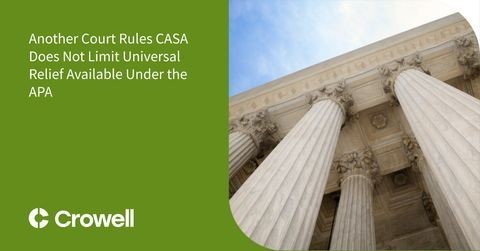Weaponizing Standard-Essential Patents: NETGEAR Sues Huawei in Violation of U.S. Antitrust Law
What You Need to Know
Key takeaway #1
Standard-Essential Patent holders that give a “take it or leave it approach” to licensing SEPs may expect responsive suits alleging monopolistic conduct.
Key takeaway #2
The NETGEAR complaint raises a frequent legal question regarding the limits of antitrust liability for Standard-Essential Patents holders.
Key takeaway #3
Standard-Essential Patent holders and those who wish to practice those standards should be mindful of the Biden Administration’s current policy and its impact on licensing negotiations, remedies, and possible enforcement activity.
Client Alert | 3 min read | 02.12.24
On January 31, 2024, NETGEAR, Inc. sued Huawei in California federal court, claiming the Chinese tech giant broke U.S. antitrust laws by refusing to license its patents on reasonable terms. The Complaint accuses Huawei of fraud, racketeering, and other offenses for allegedly withholding patent licenses for technology that NETGEAR’s routers require in order to comply with the international Wi-Fi networking standards.
NETGEAR asserts that Huawei reneged on its commitments to provide access to its standard-essential patents (“SEP”) for its Wi-Fi technology to its competitors at a fair, reasonable, and non-discriminatory price (“FRAND”). NETGEAR further accused Huawei of monopolizing standard-essential technology and engaging in racketeering by using a “worldwide scheme” to “dominate global markets by unlawfully taxing successful standards at anti-competitive rates” in order to maintain its market power and boost profits. NETGEAR’s complaint follows patent infringement lawsuits filed by Huawei against NETGEAR in Germany and China.
Background
Huawei and NETGEAR participate in the Standard-Setting Organization (“SSO”) Electrical and Electronic Engineers Standards Association (“IEEE-SA”), which develops worldwide standards for electronic communications. SSOs are made up of companies, government entities, government officials, and individuals. These organizations are an important part of the communications technology we use today, as they help set standards for vital technology, such as Wi-Fi, 5G and 6G.
The standards that SSOs set frequently involve an essential patented technology or SEPs. As such, SSO members are required to inform the SSO if they own patents that may be or may become essential to a standard in a timely fashion. While it is possible that some patent claims are directed to required potions of the standard and others to optional portions, a claim is technically essential to the standard if it is not possible to make products that comply with the required portion of the standard without practicing the claim.
In exchange for its patented technology being accepted as the standard, the patent holders must submit a declaration to the SSO committing to license their SEP’s to competitors and industry players for a reasonable and non-discriminatory price. Whether asserted SEPs are truly essential and whether the patent owner offered a license under FRAND terms are heavily disputed issues in patent infringement matters. Here, NETGEAR does not seem to dispute that Huawei’s patents are essential to the standard but that Huawei did not offer FRAND terms as required.
NETGEAR’s Complaint
NETGEAR specifically claims that Huawei provided fake letters to IEEE and made promises to members representing that it would license its SEPs for FRAND, but secretly never planned to do so. NETGEAR claims that Huawei aggressively exploited its significant power against NETGEAR by, among other things, refusing to license its patents on FRAND terms, demanding excessive and discriminatory royalties, and seeking injunctions internationally and at the Unified Patent Court.
NETGEAR asserts that this conduct is part of a scheme to dominate markets and qualifies as monopolization and attempted monopolization in violation of Section 2 of the Sherman Antitrust Act. NETGEAR also claims that Huawei is engaged in multiple unlawful schemes using unlawful means and influence to enrich Huawei at the expense of NETGEAR and others in violation of civil RICO statutes. NETGEAR also asserts breach of contract, fraud, negligent misrepresentation, promissory estoppel, and unfair business practices.
Takeaway
While the suit against Huawei raises a growing concern with Huawei’s hold on the United States technology market, it also touches on a frequent legal question regarding the limits of antitrust liability for patents holders when their patent qualifies as an SEP. In the Ninth Circuit, this case will involve the court’s interpretations of precedential decisions in both Broadcom v. Qualcomm (“Broadcom”) and FTC v. Qualcomm (“Qualcomm”). While Broadcom found that an SEP holder’s conduct can qualify as an antitrust injury, Qualcomm found that breaching a commitment to offer FRAND terms does not give rise to antitrust liability, but instead is a matter of contract law.
It also remains to be seen whether the current administration’s Department of Justice (“DOJ”) will investigate NETGEAR’s allegations considering Huawei’s large U.S. presence and DOJ’s “Draft Policy Statement on Licensing Negotiations and Remedies for Standards-Essential Patents Subject to Voluntary F/Rand Commitments,” jointly issued in December 2021 by DOJ, the U.S. Patent and Trademark Office, and the National Institute of Standards and Technology (“2021 Draft Statement”). The 2021 Draft Statement suggests that the authoring agencies may return to an earlier administration’s policies making injunctive relief for FRAND-encumbered SEPs is more difficult to obtain than for other patents. SEP holders and those who wish to practice technology covered by SEPs should be mindful of this 2021 Draft Statement and its impact on licensing negotiations, remedies, and possible enforcement activity from the Biden Administration.
Contacts
Insights
Client Alert | 3 min read | 01.05.26
Another Court Rules CASA Does Not Limit Universal Relief Available Under the APA
In Trump v. CASA, the Supreme Court significantly constrained the equitable authority of federal district courts to grant universal or nationwide injunctive relief, clarifying that, with specific exceptions, a federal court’s power to grant relief is limited to the parties before it. When it was issued, many bemoaned CASA’s implications for preventing government overreach.
Client Alert | 7 min read | 01.05.26
Consideration of Artificial Intelligence in Arbitration Terms of Reference
Client Alert | 4 min read | 12.31.25
Raising the Bar: New York Expands Consumer Protection Law with FAIR Business Practices Act
Client Alert | 4 min read | 12.30.25



